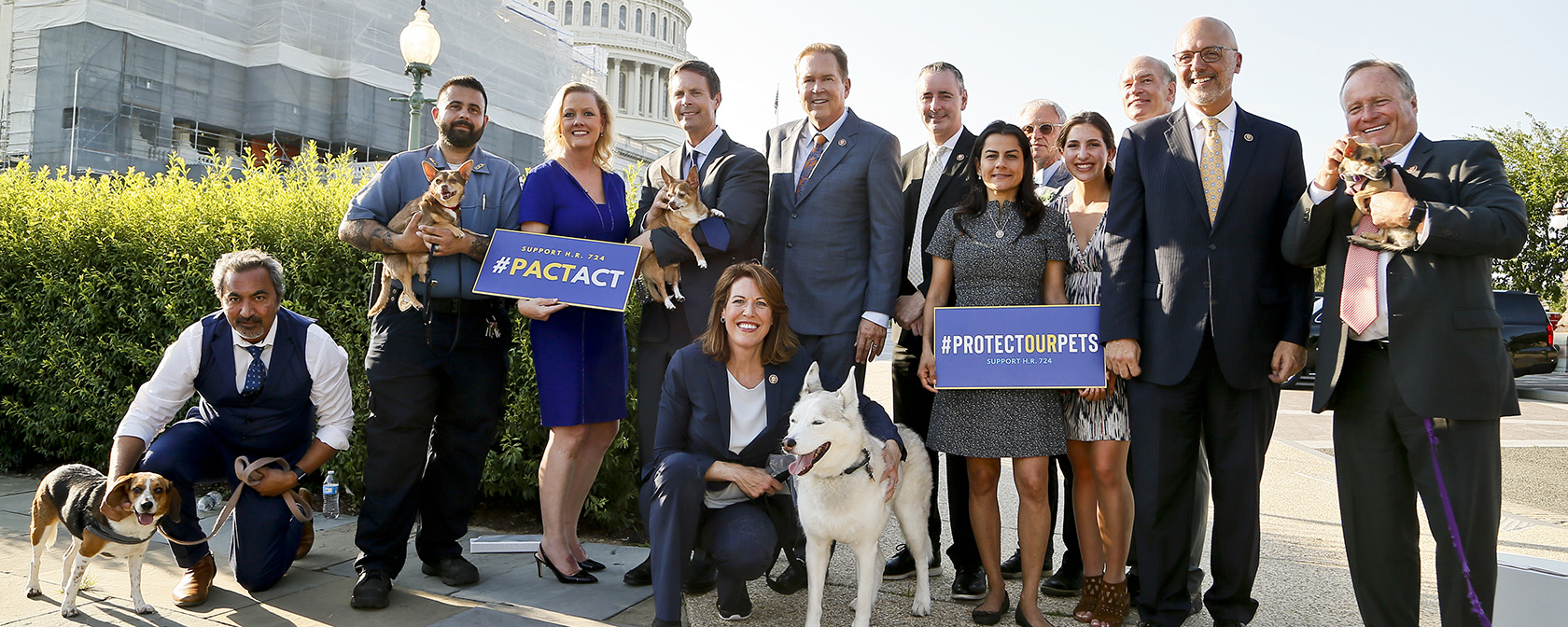By Sara Amundson and Kitty Block
State legislatures are again in session, and we’re busy in our push for the passage of animal protection laws across the country. In 2022, some 1,300 animal-related bills were introduced in the states, and dozens of valuable measures on both the state and federal levels passed. Highlights in the states included laws in Indiana to ban public contact with big cats, in New York to stop the sale of puppies in pet stores, in California to prohibit certain toxicity tests in dogs, in Arizona to eliminate battery cages, and in Louisiana and New York to end animal testing for cosmetics. State legislation often reinforces or inspires federal policy, too. For example, state-level efforts to ban contact between the public and captive big cats helped to lay the foundation for passage of the Big Cat Public Safety Act, which was signed into law last year. State-level legislation on animal testing for cosmetics has also strengthened the prospects for passage of a federal law to prohibit such procedures.
Making change for animals requires many people in a wide variety of roles working together for progress. HSUS state directors are our eyes, ears and boots on the ground. But the credit for legislation passed—or other successes in the states—is not ours to claim alone. These triumphs result from the work of thousands of citizens committed to a humane agenda for animals. Animal advocates are some of the most politically significant actors. State lawmakers, keenly attentive to what’s going on in their districts, frequently listen to humane-minded constituents who speak out for animals, which is why some of our most important work is training people in how to be most effective in advocating for animals.
Our Taking Action for Animals conference, our Lobbying 101 seminars, state volunteer networks and our Humane Lobby Days are events and opportunities where people can come together and learn how to strategically work for a more humane world. And participants in our Humane Policy Volunteer Leader program are at the forefront of our work to advance priority federal, state and local animal protection policies. One of our central training objectives is to demystify the process of political advocacy by citizens and to reinforce the confidence of our volunteers and supporters as they learn to make the case for animals in the political arena. Humane Lobby Days are essential to this work (and are coming up soon in several states: Maryland on Jan. 24, Indiana on Feb. 7, Minnesota on Feb. 15 and Tennessee on Feb. 28). The presence of well-equipped and well-prepared supporters raises the profile of animal advocates and animal issues in state capitals and reminds legislators and their staff members that our ranks are strong, we are well-organized, and we are practical and professional in our approach.
A lot has changed since we both started in this field. Now that we can train and lobby virtually, advocates can move ever more rapidly in response to emerging circumstances and opportunities. In the past it was difficult to fully participate in animal welfare work from home, but now advocates who send communications from home and make telephone or video calls are vital, as this work raises the level of engagement in unprecedented numbers.
Another relatively recent change is that most legislators today have a general understanding of animal protection aims, even if they may be less familiar with particular issues. Because animal protection is a subject with strong nonpartisan appeal, we’ve consistently demonstrated that we can work with legislators across the political spectrum in pursuit of animal protection measures that enjoy broad public support. Plus, our supporters have diverse political views and affiliations, and we do our best to be inclusive of everyone interested in making the world better for animals.
Promoting the passage of legislation is a part of a much larger agenda for animals we are supporting in the states. Good laws elevate protection for animals to the level that other social concerns enjoy, and to secure those laws, a well-informed and well-prepared base of animal advocates is essential. The work we are doing to cultivate and build that base—a broad coalition of voters who care about animals and act on their concern—is necessary for lasting progress for animal welfare. Advocating for a more humane world for animals is a way of life for so many of our staff, supporters and volunteers. In addition to voting on behalf of animal welfare, many are also involved in community-level projects, working with animal shelters, helping to address human-animal conflict concerns, supporting disaster relief activities and speaking to public and private audiences, among other work. All these efforts are part of building a world that’s better for animals and for us.
There are many ways you can help to advance animal protection legislation in your state. Consider volunteering as a Humane Policy Volunteer Leader or get involved as an HSUS Ally.
Kitty Block is President and CEO of the Humane Society of the United States.




